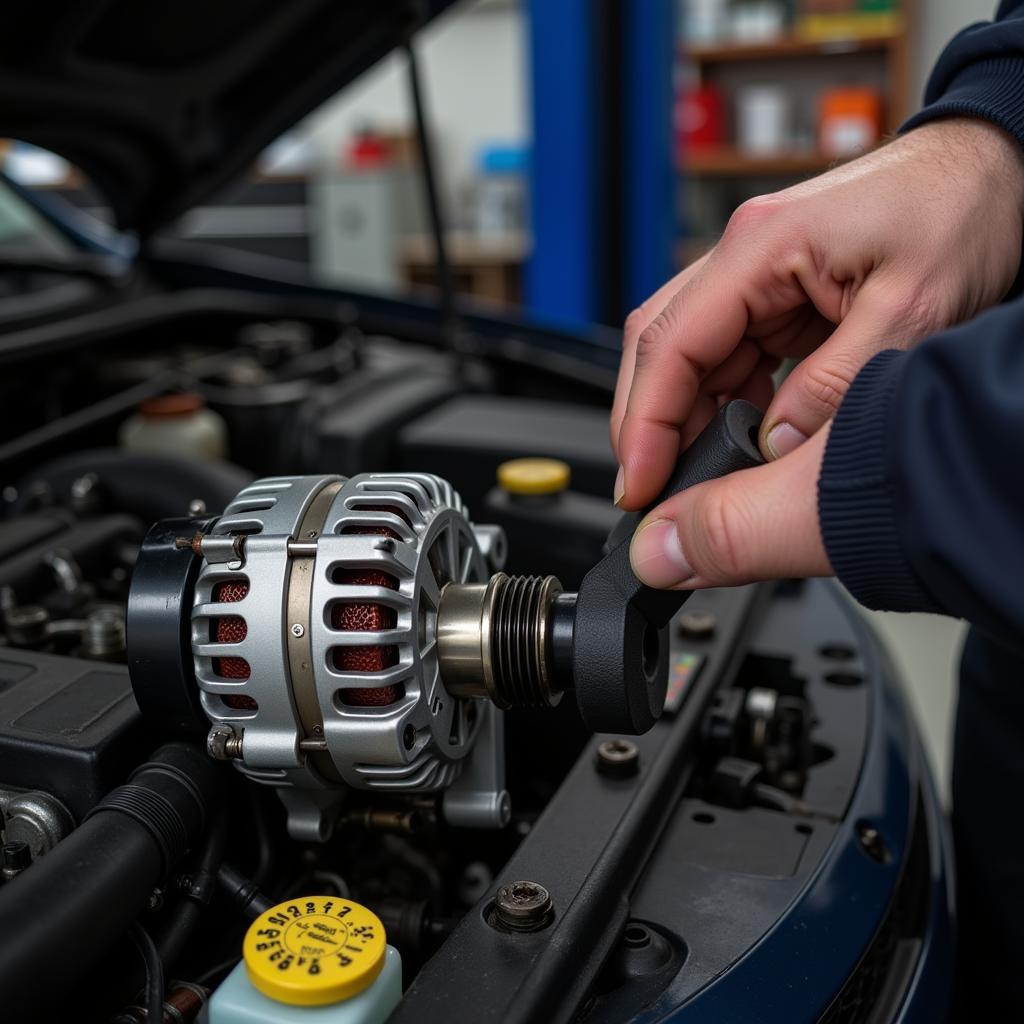Car alternator problems can be a real headache, leaving you stranded and frustrated. Recognizing the symptoms for car alternator problems is crucial for preventing breakdowns and costly repairs. This guide provides a detailed overview of the common signs of a failing alternator, empowering you to diagnose the issue early on.
Identifying the Culprit: Common Symptoms for Car Alternator Problems
Several telltale signs indicate a potential issue with your car’s alternator. Being aware of these symptoms can save you time and money down the road.
Dim or Flickering Lights
One of the earliest and most noticeable symptoms for car alternator problems is dimming headlights or interior lights. A failing alternator struggles to provide sufficient power, resulting in fluctuating light intensity. If your lights dim significantly when you accelerate or turn on other electrical components, it’s a strong indication of an alternator issue.
 Dim headlights indicating alternator problems
Dim headlights indicating alternator problems
The Dreaded Dead Battery
While a dead battery can be caused by various factors, a faulty alternator is a frequent culprit. The alternator’s primary function is to recharge the battery while the engine is running. A failing alternator can’t keep up with the demand, leading to a depleted battery and eventually a no-start situation.
Strange Noises: Growling or Whining
Unusual noises emanating from the engine bay, such as growling or whining, can signal a problem with the alternator’s internal components. These noises often intensify as engine speed increases.
Warning Lights on the Dashboard
Modern vehicles are equipped with warning lights that alert you to potential problems. A lit battery or charging system warning light is a clear indicator of an alternator issue. Ignoring this warning can lead to further complications.
Electrical Malfunctions
A malfunctioning alternator can cause a range of electrical issues, including problems with power windows, radio, and other accessories. These malfunctions often occur intermittently or become progressively worse as the alternator deteriorates.
What to Do if You Suspect an Alternator Problem
If you experience any of the symptoms for car alternator problems mentioned above, it’s essential to take action promptly.
- Check the Battery: Use a voltmeter to test the battery voltage. A healthy battery should read around 12.6 volts with the engine off.
- Inspect the Alternator: Visually inspect the alternator for any loose connections, worn belts, or signs of damage.
- Seek Professional Help: If you’re unsure about the diagnosis or lack the necessary tools, take your vehicle to a qualified mechanic. They can perform a thorough inspection and confirm the problem.
“A timely alternator replacement can prevent further damage to your vehicle’s electrical system and avoid costly repairs,” advises John Smith, ASE Certified Master Technician.
Why Addressing Alternator Issues is Crucial
Ignoring symptoms for car alternator problems can lead to various consequences, including:
- Complete Electrical Failure: A failing alternator can eventually stop working altogether, resulting in a complete loss of electrical power. This can leave you stranded and require costly towing services.
- Damage to Other Components: A faulty alternator can put excessive strain on the battery and other electrical components, leading to premature failure.
- Safety Hazards: A sudden loss of electrical power while driving can create dangerous situations, especially at night or in heavy traffic.
“Regular vehicle maintenance, including checking the alternator’s performance, is vital for preventing unexpected breakdowns and ensuring the longevity of your car’s electrical system,” adds Emily Davis, Automotive Electrical Systems Engineer.
Conclusion: Don’t Ignore the Warning Signs
Recognizing the symptoms for car alternator problems is essential for preventing breakdowns and costly repairs. By addressing these issues promptly, you can ensure the reliability and safety of your vehicle. Don’t hesitate to reach out to the experts at AutoTipPro for any assistance. We’re here to help! Call us at +1 (641) 206-8880 or visit our office at 500 N St Mary’s St, San Antonio, TX 78205, United States.
 Mechanic repairing car alternator
Mechanic repairing car alternator
FAQ
-
How long does an alternator typically last? Alternators typically last between 7-10 years, but their lifespan can vary depending on usage and environmental factors.
-
Can I drive with a bad alternator? You can drive a short distance with a failing alternator, but it’s not recommended. The battery will eventually drain, leaving you stranded.
-
How much does it cost to replace an alternator? The cost of alternator replacement varies depending on the vehicle make and model, but it typically ranges from $300 to $800.
-
How can I prevent alternator problems? Regular vehicle maintenance, including checking the drive belt tension and keeping the battery terminals clean, can help prevent alternator problems.
-
What are some other signs of a bad alternator? Other less common signs include a burning smell, flickering dashboard lights, and slow engine cranking.
-
Is it difficult to replace an alternator myself? Replacing an alternator can be challenging if you lack mechanical experience. It’s often best to leave this task to a qualified mechanic.
-
Can a bad alternator cause damage to my car’s computer? In some cases, a faulty alternator can cause electrical surges that damage sensitive electronic components, including the car’s computer.





Leave a Reply